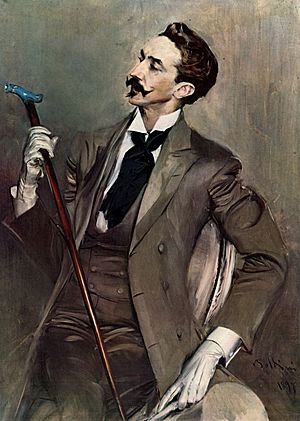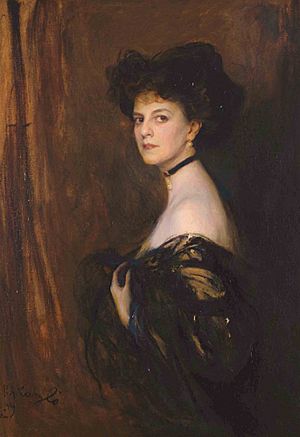In Search of Lost Time facts for kids
In Search of Lost Time (French: À la recherche du temps perdu), first translated into English as Remembrance of Things Past, is a novel in seven volumes by French writer Marcel Proust. The novel gained fame in English in translations by C. K. Scott Moncrieff and Terence Kilmartin. The title In Search of Lost Time, a literal rendering of the French, became ascendant after D. J. Enright adopted it for his revised translation published in 1992.
In Search of Lost Time follows the narrator's recollections of childhood and experiences into adulthood in the late 19th-century and early 20th-century high-society France, while reflecting on the loss of time and lack of meaning in the world. Proust began to shape the novel in 1909; he continued to work on it until his final illness in the autumn of 1922 forced him to break off. Proust established the structure early on, but even after volumes were initially finished, he continued to add new material and edited one volume after another for publication. The last three of the seven volumes contain oversights and fragmentary or unpolished passages, as they existed only in draft form at the death of the author. His brother Robert oversaw editing and publication of these parts.
The work was published in France between 1913 and 1927. Proust paid to publish the first volume (with the Grasset publishing house) after it had been turned down by leading editors who had been offered the manuscript in longhand. Many of its ideas, motifs and scenes were anticipated in Proust's unfinished novel Jean Santeuil (1896–1899) and in his unfinished hybrid of philosophical essay and story, Contre Sainte-Beuve (1908–09).
The novel had great influence on twentieth-century literature; some writers have sought to emulate it, others to parody it. For the centenary of the French publication of the novel's first volume, American author Edmund White pronounced In Search of Lost Time "the most respected novel of the twentieth century."
Contents
Structure
| Vol. | French titles | Published | English titles |
|---|---|---|---|
| 1 | Du côté de chez Swann | 1913 | Swann's Way The Way by Swann's |
| 2 | À l'ombre des jeunes filles en fleurs | 1919 | Within a Budding Grove In the Shadow of Young Girls in Flower |
| 3 | Le Côté de Guermantes (published in two volumes) |
1920/21 | The Guermantes Way |
| 4 | Sodome et Gomorrhe (published in two volumes) |
1921/22 | Cities of the Plain Sodom and Gomorrah |
| 5 | La Prisonnière | 1923 | The Captive The Prisoner |
| 6 | La Fugitive Albertine disparue |
1925 | The Fugitive The Sweet Cheat Gone Albertine Gone |
| 7 | Le Temps retrouvé | 1927 | The Past Recaptured Time Regained Finding Time Again |
Related pages
Images for kids
-
Portrait of Mme. Geneviève Bizet, née Geneviève Halévy, by Jules-Élie Delaunay, in Musée d'Orsay (1878). She served as partial inspiration for the character of Odette.
-
The beach at Cabourg, a seaside resort that was the model for Balbec in the novel
-
The Destruction of Sodom and Gomorrah, John Martin, 1852. The fourth volume opens with a discussion of the inhabitants of the two Biblical "cities of the plain".
See also
 In Spanish: En busca del tiempo perdido para niños
In Spanish: En busca del tiempo perdido para niños








